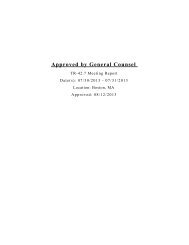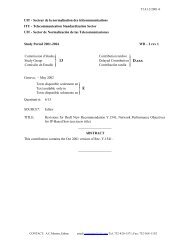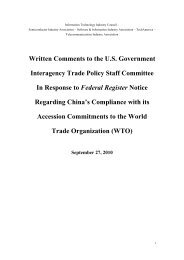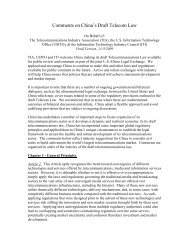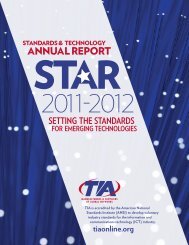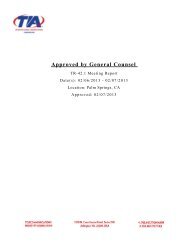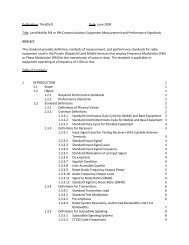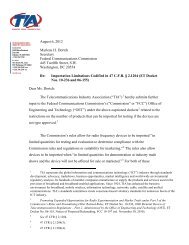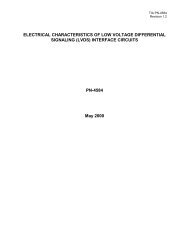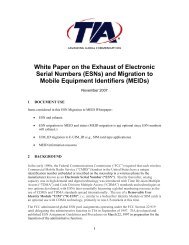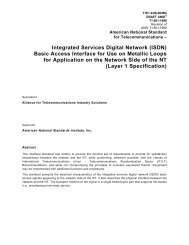ITU-T V.150.1
ITU-T V.150.1
ITU-T V.150.1
- No tags were found...
You also want an ePaper? Increase the reach of your titles
YUMPU automatically turns print PDFs into web optimized ePapers that Google loves.
48:55 XID/LR field Octet 6: V.44 capability (C0)<br />
56:63 XID/LR field Octet 7: V.44 data compression request (P0)<br />
64:79 XID/LR field Octet 8 and 9: V.44 number of codewords in transmit direction (P1T)<br />
80:95 XID/LR field Octet 10 and 11: V.44 number of codewords in receive direction (P1R)<br />
96:103 XID/LR field Octet 12: V.44 maximum string length in transmit direction (P2T)<br />
104:111 XID/LR field Octet 13: V.44 maximum string length in receive direction (P2R)<br />
112:127 XID/LR field Octet 14 and 15: V.44 length of history in transmit direction (P3T)<br />
128:143 XID/LR field Octet 16 and 17: V.44 length of history in receive direction (P3R)<br />
Notes:<br />
† If protocol support=Yes, the modem will attempt/accept the use of this protocol during V.42 detection<br />
phase (which includes attempting/accepting the “alternate” – Annex A protocol). If protocol support=No, the<br />
modem explicitly does not ever attempt/accept this protocol, and will be unable to operate in this mode. If<br />
protocol support=unknown, the gateway has insufficient knowledge to make a prediction.<br />
‡ If compression support=Yes, an originating modem will propose this compression method during XID/LR<br />
negotiation. A terminating modem will choose one such proposed method during negotiation, if the<br />
terminating modem itself supports that method. If several acceptable compressions were proposed, a<br />
terminating modem must choose only one, and will “prefer” V.44 to V.42 bis (LAPM), or prefer V.42 bis to<br />
MNP5 – if none of the proposed compressions are acceptable, No Compression is chosen.<br />
If all fields in B0 to B15 are “unknown”, the PROF_XCHG message need not be sent, since the<br />
non-reception of this message indicates the gateway’s lack of knowledge.<br />
If compression support=No, the modem will not propose this method (if originating), and will never<br />
make this choice (if terminating). Note that LAPM supports only (V.44, V.42 bis) and Annex<br />
A/V.42 (1996) supports only (V.42 bis, MNP5), regardless of noted compression support; no<br />
compression is supported if there is no protocol.<br />
If compression support=Unknown, the gateway has insufficient knowledge to make a prediction.<br />
If all the protocols that support a compression method are not supported, then the compression<br />
method is not supported and should be notated as such. If all the protocols which support a<br />
compression have unknown support, then the compression’s support is unknown and again should<br />
be notated as such. Finally, repeating from above, if all protocols and compressions have unknown<br />
support, the PROF_XCHG message need not be sent.<br />
If a compression method is not supported or the support is unknown, the corresponding<br />
Compression parameter fields must be set to zero. However, it is permissible to not send trailing<br />
unsupported/unknown compression fields.<br />
15.4.11 User Data (INFO messages)<br />
This section defines the user-data message formats used for Modem Relay.<br />
15.4.11.1 Octet without Formatting (I_OCTET)<br />
If the CONNECT message indicates not to use a DLCI then the format of this messages is shown in<br />
the following figure.<br />
<strong>ITU</strong>-T Rec. <strong>V.150.1</strong> (01/2003) – Prepublished version 44



